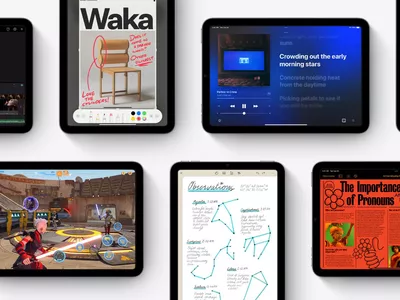
New Crew Collaboration The Vital Roles and Responsibilities on a Film Production Team

“Crew Collaboration: The Vital Roles and Responsibilities on a Film Production Team”
When shooting a small-scale video, only one person handles all department workings. He or she works not only as a director, but also a cinematographer and the camera operator.
However, as the production grows and needs large-scale filming, more specific members are needed for different departments. Whether you want to set up a filming studio, or join a movie-making workshop, you’d better figure out the entire composition of the film crew and choose the best one according to your capabilities.
To simplify the scenario, we have divided the crew into these major departments, as shown below, with their work areas.
What Is the Role of a Producer?
The producer is the main handler of the filming. Before filming, he finds out the content and directions and links with the director and DP for each direction to get the best vision of the music video. The producer are responsible for:
1. Schedule the crew members
Producers can make the call sheets for the crew members to maintain their schedule according to the specific timelines.
2. Find the studio space
To find the studio space, the producers work with the directors to get the exact location according to the script of their music video for better illustrations.
3. Find the gear
Producers found the gear for the studio space and handled the renting of the equipment from the warehouse.
4. Build relationships with the industries
If the filming is starting and you don’t know who to choose, you should build a relationship with the appropriate people in the industry. So that when you are in trouble, you can call them off to get the solution.
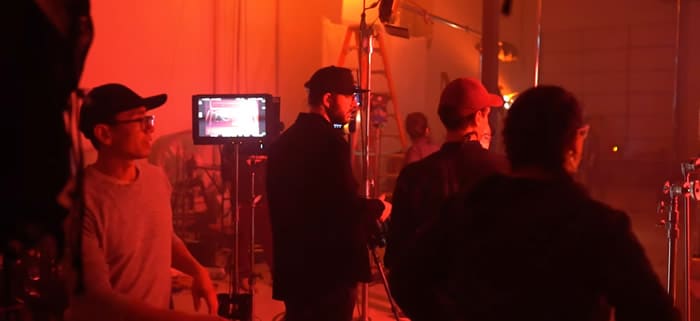
Roles of a Director Department
The director is considered to be in charge of filmmaking. His main responsibility is creatively giving the idea to the production and communicating to the crew and characters to check out what they want in their scenes to play out.
The director department mainly consists of the director and the first assistant director, and sometimes there is a 2nd, a 3rd, and 4th AD. For example,
1st AD
The first lead is mainly in charge of time management, communicate with the crew member, and ensuring that the shorts get done safely and readily.
![]()
Note: If there is no dialogue in the shorts, then the director usually gives reference pictures of the scenes and moods to act in that way.
You need to work with different people in the industry to check their personalities and work according to them. There is no need to work with the same people repeatedly.
Team for Production Designing
The next and foremost department is the production design. In this the production designer is the leader of all and has to work with the art director. He is mainly in charge of the set builders, set dressers, prop makers, hair and makeup, and costume and wardrobe departments.
In this department, the production designer is mainly involved in decorating the sets, making props, and setting up the lighting.
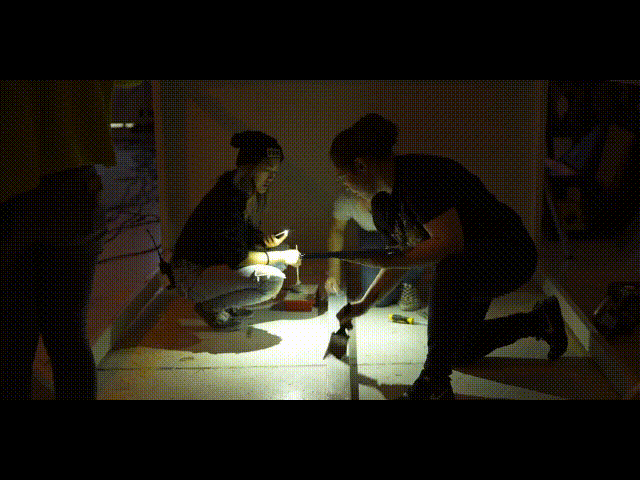
Cinematographers Department
The cinematic department comes to the frontline to give the shots and the lit music video final touches. In this, the head of the department is also known as the director of photography.
Director of photography
He mainly decides how the shots and the music video footage look. The main action is to handle the lightning and interact with the lights with the environment and the characters. He should build relationships with each other for better illusions.
Director’s monitor
The director’s monitor is the screen that displays a live shoot and filming of everything happening on camera. It mainly gives each take’s exact position and views for coordinating with the director and the DP.
Due to this, they can change the direction and the setup wherever they want and whenever they want.
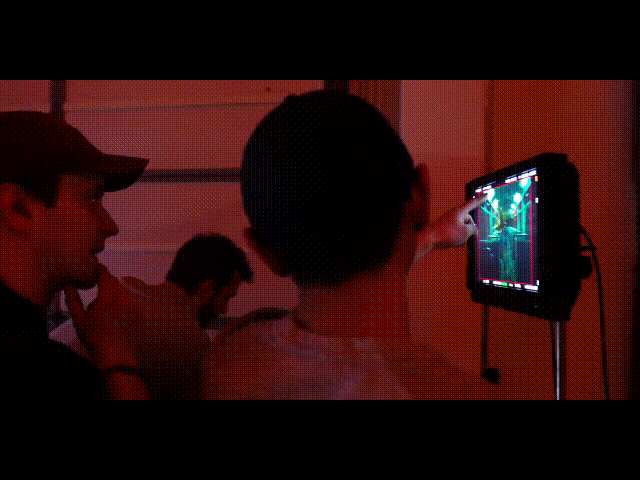
Camera operators
To operate the camera, the DPs are not involved, but there is a specific job of the camera operators, which handle the shots and moves according to the director’s directions. There are also 1st and 2nd Assistant Cameras (AC) with the camera operators.
1st Assistant Camera
The duty of the 1st AC is to focus on the required target, pulling, swapping the lenses from the camera. He is ensuring that the camera is all set and workable on the shoot day without any trouble.
2nd Assistant Camera
The 2nd AC has to consider the slates of the shots, place exact locations and markers for the characters, and give exposed footage to save for the backup.
Gaffers and key grip
Gaffers and key grip have their own teams for maintaining the lighting and grip work assigned by the DP according to the creative plans.
Digital media technician
It is essential to get the backup of footage of every shot. If you are working on a large scale, the backup planner is recognized as the Digital Media Technician (DMT).
DMT will handle the exposed footage, which Digital Memory Card will do with tapes denoting the card’s number. Make sure to make two backups of the footage to prevent any trouble.

![]()
Note: Making two copies for the backup will reduce the risk of corrupted files and physical accidents of losing the footage.
Additional Roles
If you are the music video director, you need a Cinematographer with Camera Operators. He will be in charge of pulling and adjusting all the camera alignments. If you have enough budget, go with the co-producer to help you direct the talents.
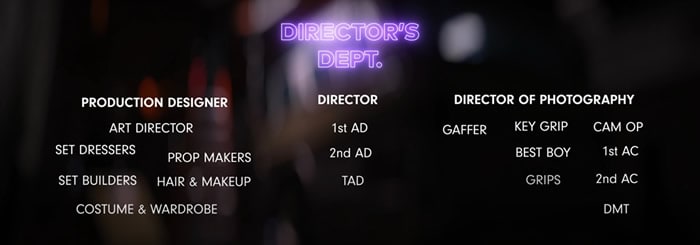
To make your subject looks good and modern according to the theme, you should hire hair and makeup artist. If you have more budget, you can do it professionally with more and more crew members.
Conclusion
If you are a starter, then there is no need to worry to pull-off all the roles in a crew; you just need two to three people for the start-up. That’s all about the large production, but whenever you scale up, you should know how to manage all the members with their required areas.
You need to work with different people in the industry to check their personalities and work according to them. There is no need to work with the same people repeatedly.
Team for Production Designing
The next and foremost department is the production design. In this the production designer is the leader of all and has to work with the art director. He is mainly in charge of the set builders, set dressers, prop makers, hair and makeup, and costume and wardrobe departments.
In this department, the production designer is mainly involved in decorating the sets, making props, and setting up the lighting.

Cinematographers Department
The cinematic department comes to the frontline to give the shots and the lit music video final touches. In this, the head of the department is also known as the director of photography.
Director of photography
He mainly decides how the shots and the music video footage look. The main action is to handle the lightning and interact with the lights with the environment and the characters. He should build relationships with each other for better illusions.
Director’s monitor
The director’s monitor is the screen that displays a live shoot and filming of everything happening on camera. It mainly gives each take’s exact position and views for coordinating with the director and the DP.
Due to this, they can change the direction and the setup wherever they want and whenever they want.

Camera operators
To operate the camera, the DPs are not involved, but there is a specific job of the camera operators, which handle the shots and moves according to the director’s directions. There are also 1st and 2nd Assistant Cameras (AC) with the camera operators.
1st Assistant Camera
The duty of the 1st AC is to focus on the required target, pulling, swapping the lenses from the camera. He is ensuring that the camera is all set and workable on the shoot day without any trouble.
2nd Assistant Camera
The 2nd AC has to consider the slates of the shots, place exact locations and markers for the characters, and give exposed footage to save for the backup.
Gaffers and key grip
Gaffers and key grip have their own teams for maintaining the lighting and grip work assigned by the DP according to the creative plans.
Digital media technician
It is essential to get the backup of footage of every shot. If you are working on a large scale, the backup planner is recognized as the Digital Media Technician (DMT).
DMT will handle the exposed footage, which Digital Memory Card will do with tapes denoting the card’s number. Make sure to make two backups of the footage to prevent any trouble.

![]()
Note: Making two copies for the backup will reduce the risk of corrupted files and physical accidents of losing the footage.
Additional Roles
If you are the music video director, you need a Cinematographer with Camera Operators. He will be in charge of pulling and adjusting all the camera alignments. If you have enough budget, go with the co-producer to help you direct the talents.

To make your subject looks good and modern according to the theme, you should hire hair and makeup artist. If you have more budget, you can do it professionally with more and more crew members.
Conclusion
If you are a starter, then there is no need to worry to pull-off all the roles in a crew; you just need two to three people for the start-up. That’s all about the large production, but whenever you scale up, you should know how to manage all the members with their required areas.
Time-Efficient Tips to Purify Audio From Static Interference
It will be challenging to remove static noise from audio since the language is often muddled by ambient noise, such as the dreaded whirring of an air conditioning unit or fans. This can make it challenging to get good audio. It is common practice to eliminate background noise before recording and mixing sound effects or working on other areas of the video’s design.
You are lucky since the Internet allows you to choose a few strategies for removing noise from audio. You may lessen the amount of noise in your video or audio recording by including some background music or by utilizing software that edits audio or video. This article will significantly assist you in searching for a method to remove static sound from audio, so keep that in mind as you read it. Let’s get started!
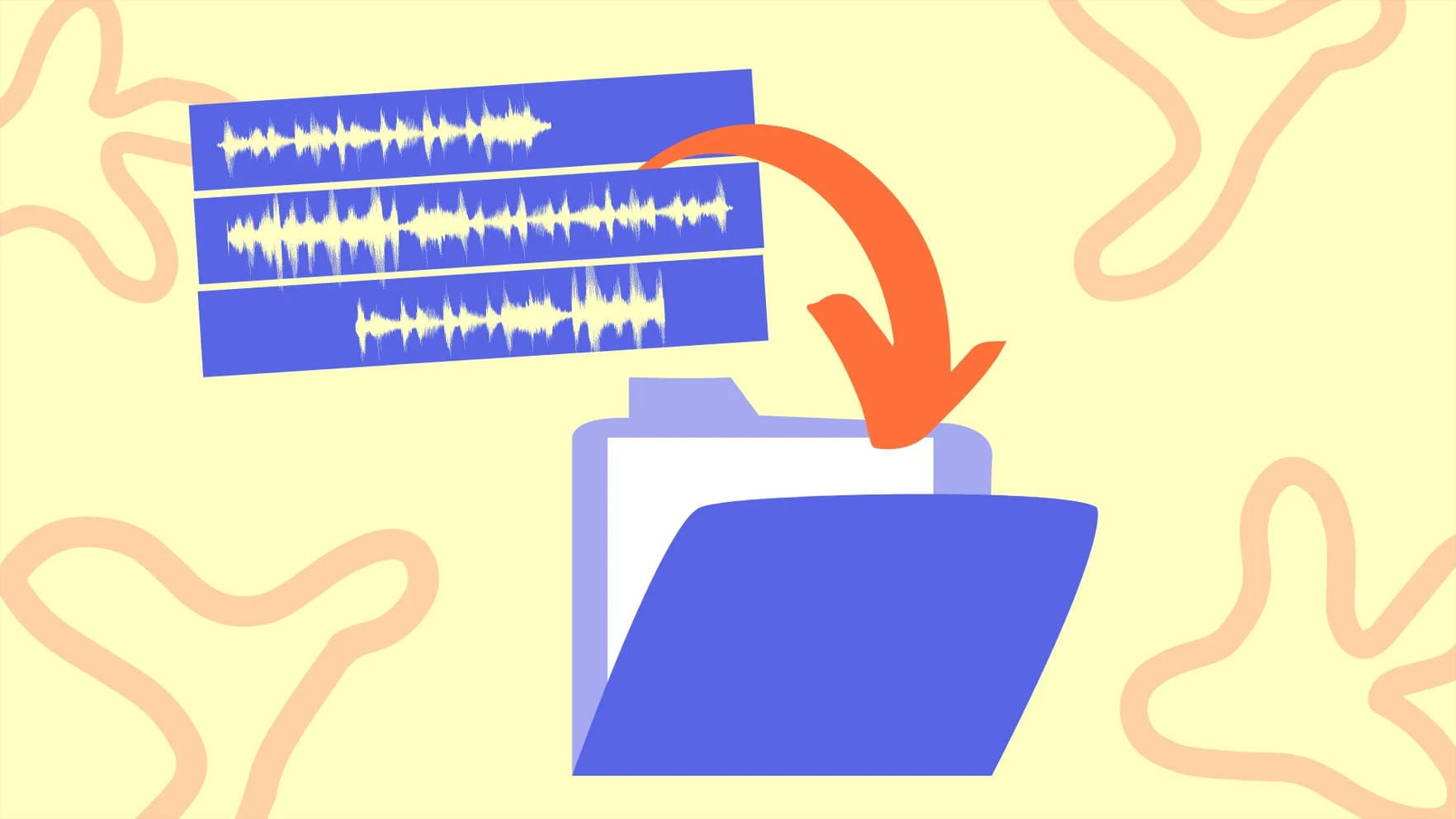
Part 1: How to Remove Static Noise from Audio Files with Only & Free tools?
Consider shaky or unclear video to be a problem. Audio noise may damage your video just as fast as poor visual quality. It may be tricky to remove static sound from audio, however. Additionally, it might be difficult to capture clear audio, particularly in busy areas. There are occasions when you get hissy or otherwise noisy audio, whether because of background noise or less-than-ideal equipment.
1. Audiodenoise
The tool lets you change many things, like the time smoothing of the noise reduction filter, the noise model based on tracking noise modulation, the size of the analysis blocks, etc. So, how do you remove the static audio in the background?
Here are the steps to take.
How to use Audio Denoise to get rid of static noise
Step1 Click on the “Choose File” option to start. You can also choose the video from the list of “Demo files.”
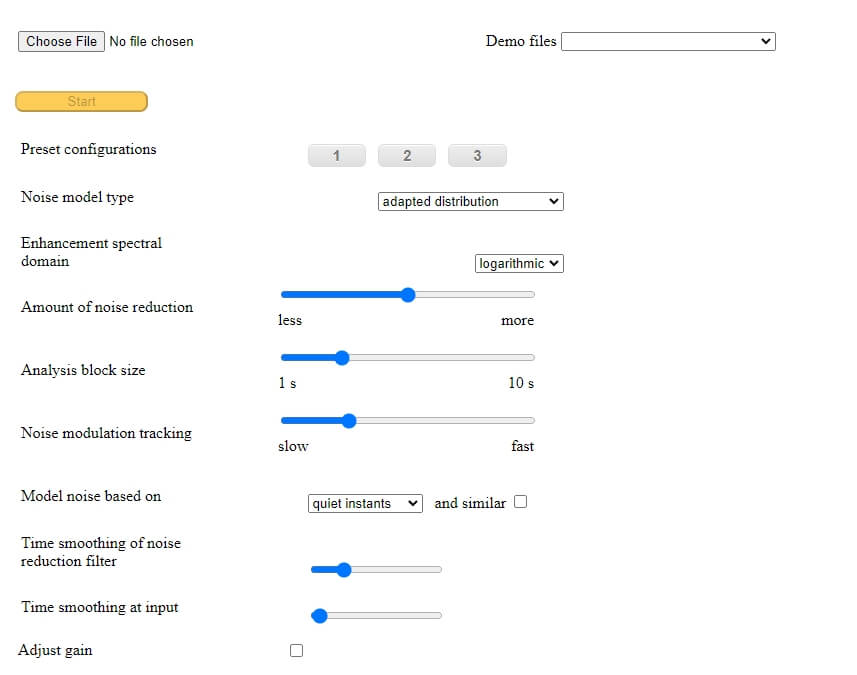
Step2 Press the Process button after you’ve uploaded the file to eliminate the noise in the audio.
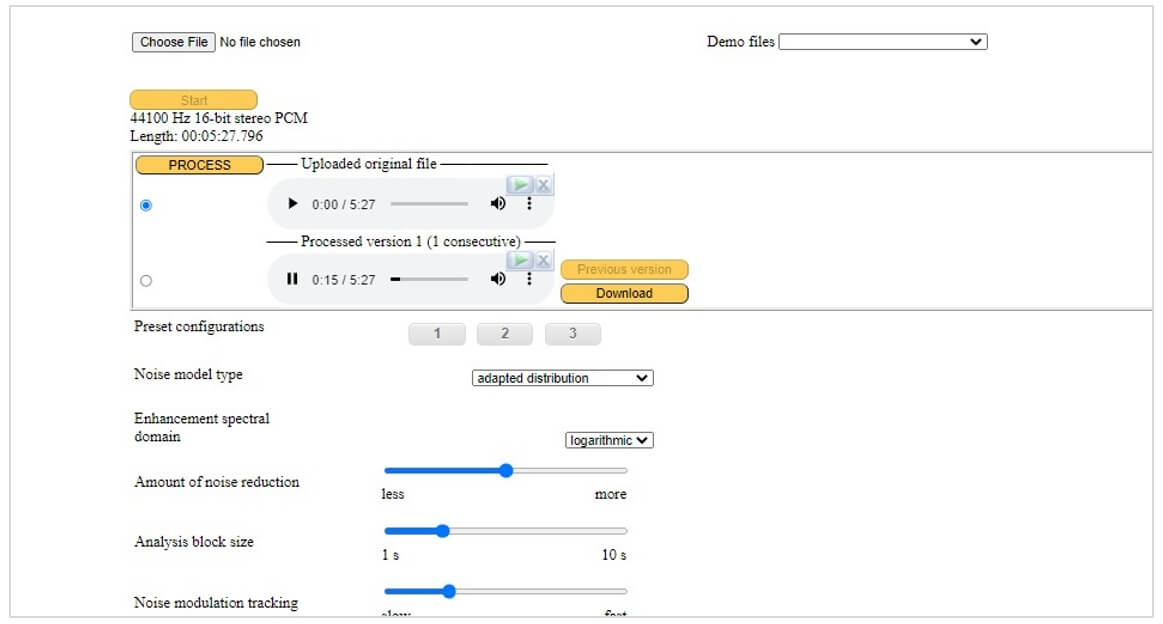
Step3 After the audio is done being processed, click the Download button to save your video to your PC.
2. Wondershare AILab
You may remove static from audio by using Wondershare AILab. There is no need to specify any settings since the AI will identify and eliminate noise on its own automatically. To improve audio quality, use a noise reduction technique based on AI. No more noise will be from the breeze, the crowd, or another unwelcome sound. AILab gives you access to various free online tools that make creating images, sounds, and videos simpler and more enjoyable.
How to use Wondershare AILab to remove static sound from audio
Step1 First, choose or drag your audio file to start uploading it.

Step2 The AI will analyze the file automatically and eliminate the static sound.

Step3 Finally, at this moment, download the revised audio file.
3. Veed.io
With VEED, you can simultaneously record your computer screen and camera, making it simple to produce instructional films for professional or personal use.
VEED is one of the most straightforward online video editors that can remove static from audio with just one click of the mouse, making it an excellent choice for people who are just starting. You don’t need to re-record your audio or purchase expensive microphones that block sound. It can help you eliminate background noise from MP3, WMA, and other audio files, but with a watermark.
How do I remove static sound from the audio file using Veed online?
Step1 To upload your audio file, click the “Choose Audio” button to upload your audio file.

Step2 Click on the audio track to open the Settings menu, then choose “Clean Audio” from the list of options. The background noise will vanish on its own in a few seconds.
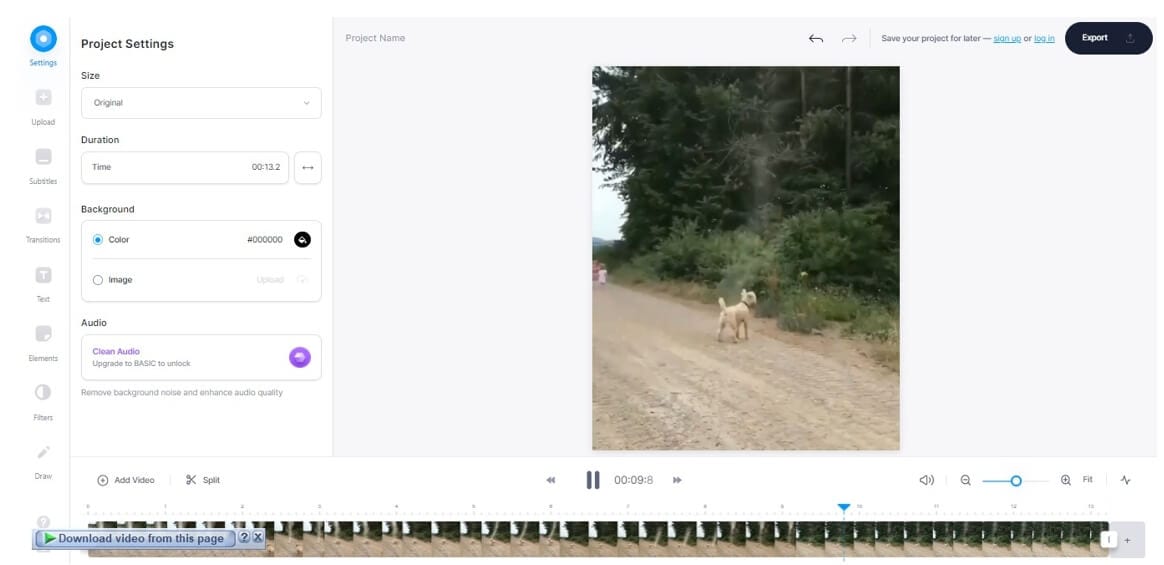
Step3 That’s it; you’re done. When you click “Export,” you will make your new file in a few seconds.
Part 2: How to improve your audio in the best way?
Wondershare is the company that has produced the Filmora family of video production and editing apps. Filmora offers software that may be used by various skill levels, from novice to intermediate. A timeline, a preview window, and an effects library are some of the standard elements of Filmora. These features are accessed and controlled by a drag-and-drop user interface.
Free Download For Win 7 or later(64-bit)
Free Download For macOS 10.14 or later
The Filmora software collection may run on machines running either Windows or macOS operating systems. It is possible to get free product samples to test them out before buying them. On the official Filmora website, you can see pricing choices for each program.
The Filmora Video Editor is easy to use and delivers various features superior to those provided by other video editors. Because of this, it is considered one of the best audio editors to answer how to remove static from audio and video.
Here is how to remove static noise from audio with Filmora.
Step1 Upload Files
Open Wondershare Filmora and load your video into the timeline window. You can get a video preview, cut it up, and remove the bits you don’t want to preserve.
Step2 Edit Audio
Select “Edit Audio” by using the context menu after right-clicking the movie in the timeline. You will see four options: silence detection, modify audio, disconnect audio, and mute. Choose the “Audio” option from the drop-down menu if you want to separate the audio from the video.
Step3 Remove Background Static
Double-click on the audio track to eliminate the background noise directly, and pick “normal denoise” from the Edit Panel. You may also double-click the video clip in the timeline to reach the Editing panel without first separating the audio from the video. Once there, you can edit the audio and eliminate the noise by clicking on the Audio tab in the Editing panel.
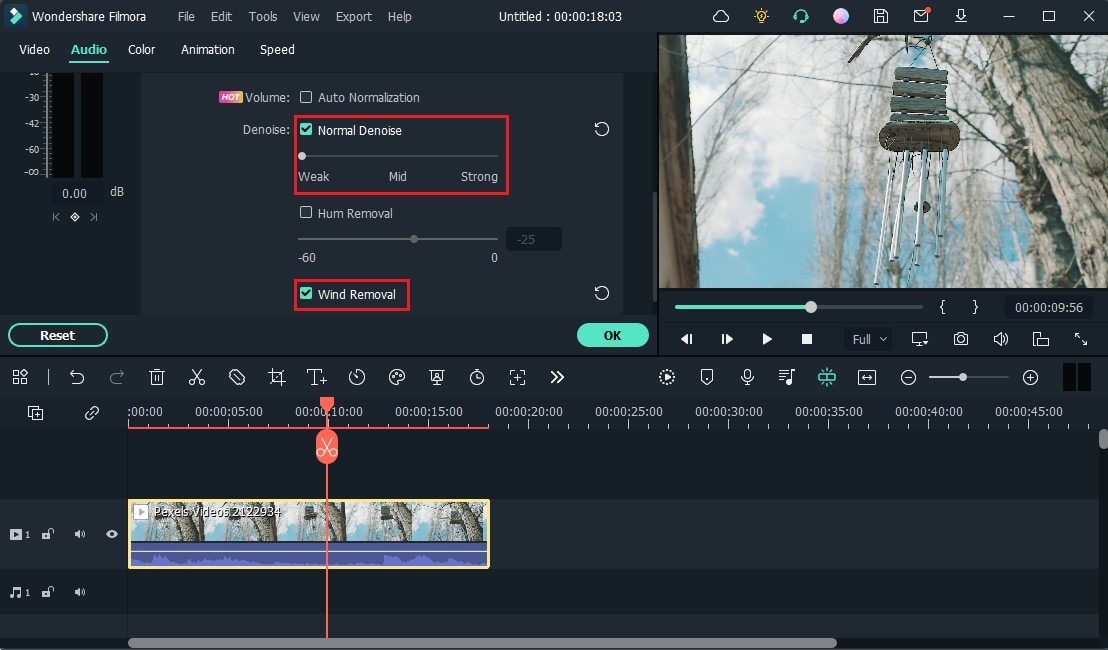
Step4 Fine Tune and Export
Lastly, with Equalizer, fine-tune the sound to make it more natural. For a better effect, adjust the audio frame by frame until it fits perfectly with the video. After the result, you can click “Export” to save the less noisy video on your PC or directly post it to YouTube or Vimeo.
Part 3: How to Record Noise-Free Audio?
So, that was how to remove static sound from audio. But what if you record noise-free audio instead?
If you record with a microphone and continue to hear static noise, the problem most likely lies in the cable. Most microphone cables consist of one or two conductors (wires) braided together inside a metal. This is the function that protection fulfills. It prevents the hum or static created by signals coming from outside from interfering with the signal flowing via the internal conductors.
If one of the shield connections at either end of the wire is only sometimes present or isn’t there, this might produce static electricity. If you can access the connection, check that all cables and shields are connected safely and securely.
Near a stable electromagnetic source is another possible explanation for static, which may be industrial motors or high-power radio transmitters.
Another characteristic of microphones is their impedance. It would be best to use microphone with the same impedance as the recording device.
One last step is to test the static using a different microphone to determine whether the problem persists. If this is the case, the recording device can be the source of the issue.
Conclusion
Do you believe that a grainy or unsteady video is a problem? Video quality is vital, but audio noise can quickly damage your film. However, removing static sound from audio may be a pain in the neck. In addition, capturing clear audio may be challenging, particularly in areas with a lot of background noise.
Now you have an audio file with less or no noise and want to learn how to remove static noise from audio. With the above suggestions, I hope you’ll find eliminating background noise from the video easy. If you want to be more creative in removing static noise from audio, try the Filmora video editor to give your mind a boost.
Free Download For macOS 10.14 or later
The Filmora software collection may run on machines running either Windows or macOS operating systems. It is possible to get free product samples to test them out before buying them. On the official Filmora website, you can see pricing choices for each program.
The Filmora Video Editor is easy to use and delivers various features superior to those provided by other video editors. Because of this, it is considered one of the best audio editors to answer how to remove static from audio and video.
Here is how to remove static noise from audio with Filmora.
Step1 Upload Files
Open Wondershare Filmora and load your video into the timeline window. You can get a video preview, cut it up, and remove the bits you don’t want to preserve.
Step2 Edit Audio
Select “Edit Audio” by using the context menu after right-clicking the movie in the timeline. You will see four options: silence detection, modify audio, disconnect audio, and mute. Choose the “Audio” option from the drop-down menu if you want to separate the audio from the video.
Step3 Remove Background Static
Double-click on the audio track to eliminate the background noise directly, and pick “normal denoise” from the Edit Panel. You may also double-click the video clip in the timeline to reach the Editing panel without first separating the audio from the video. Once there, you can edit the audio and eliminate the noise by clicking on the Audio tab in the Editing panel.

Step4 Fine Tune and Export
Lastly, with Equalizer, fine-tune the sound to make it more natural. For a better effect, adjust the audio frame by frame until it fits perfectly with the video. After the result, you can click “Export” to save the less noisy video on your PC or directly post it to YouTube or Vimeo.
Part 3: How to Record Noise-Free Audio?
So, that was how to remove static sound from audio. But what if you record noise-free audio instead?
If you record with a microphone and continue to hear static noise, the problem most likely lies in the cable. Most microphone cables consist of one or two conductors (wires) braided together inside a metal. This is the function that protection fulfills. It prevents the hum or static created by signals coming from outside from interfering with the signal flowing via the internal conductors.
If one of the shield connections at either end of the wire is only sometimes present or isn’t there, this might produce static electricity. If you can access the connection, check that all cables and shields are connected safely and securely.
Near a stable electromagnetic source is another possible explanation for static, which may be industrial motors or high-power radio transmitters.
Another characteristic of microphones is their impedance. It would be best to use microphone with the same impedance as the recording device.
One last step is to test the static using a different microphone to determine whether the problem persists. If this is the case, the recording device can be the source of the issue.
Conclusion
Do you believe that a grainy or unsteady video is a problem? Video quality is vital, but audio noise can quickly damage your film. However, removing static sound from audio may be a pain in the neck. In addition, capturing clear audio may be challenging, particularly in areas with a lot of background noise.
Now you have an audio file with less or no noise and want to learn how to remove static noise from audio. With the above suggestions, I hope you’ll find eliminating background noise from the video easy. If you want to be more creative in removing static noise from audio, try the Filmora video editor to give your mind a boost.
Explore These 5 Pinnacle Platforms for Efficient MP3 File Tagging
Do you like songs? Generally, people love and enjoy listening to songs because it relaxes them. Some people work with music, some study with music, whereas some go to the gym and sweat on the beats. The question is, do you just enjoy the music or do you get proper knowledge about it?
ID3 tags are the metadata in MP3 files which contain information regarding the content like its title, artist, album, genre, and other things. In case you want to change the tags, you can take help from the online MP3 tag editors. Let us discuss the 5 best tag editors that could be used.
Part 1. 5 Best Online MP3 Tag Editor Websites That You Can’t Miss
There are two types of music lovers, one who just listens to enjoy. Whereas others like to collect music and maintain a tag library. MP3 files have metadata, and this consists of information regarding the music file other than its name. Do you know the MP3 tag is the best business? Let’s talk more about it and share 5 great music tag editors online.
1. TagMP3.net
TagMP3.net is a free website for changing music tags, album arts, and other ID3 as well. With this website, you don’t have to download or install any software or application to change the ID3 tags of your MP3 files. A cool thing about TagMP3.net is that it can be accessed from any platform regardless of the device being used. You only need a strong internet connection to use the online editor.
This online automatic MP3 tag editor updates the ID3 version to ID3v2 for the MP3 files. This editor comes with a very easy and user-friendly interface, and you don’t need much assistance to use it. With TagMP3.net, you can easily upload the audio file from your hard drive, or else for uploading a file from an online database, enter its URL.
How to Use TagMP3.net?
Step 1: Start by searching and opening the TagMP3.net editing tool on your browser. Then you have to upload the files for that, hit the ‘Choose Files’ button and add the file. Or else, you can also copy-paste the URL or drag and drop the file.

Step 2: Now, the music tag editor online will spontaneously add the metadata found on the internet. You can then check and verify the added information and make changes if required.

Step 3: After all the data is finalized, you can tap on the ‘Generate New File’ button. As soon as you do this, you are redirected to the ‘Download’ page. At this point, download the copy of the audio file that contains the correct metadata.

2. MP3Repair
MP3Repair is an online MP3 tag editor with many other diverse features. Apart from editing MP3 tags, the tool could also be used for repairing online audio lengths and playtimes, cutting MP3 files and removing advertising, etc.
MP3Repair is a freeware, online editor that allows both repair and edit of MP3 files uploaded from your device or else from an online database. This online tool has a clean and understandable interface that users can work with easily.
Guideline to Use MP3Repair
Step 1: Open the web browser on your device and search for MP3Repair, then open its official webpage to start the work. After that, upload the MP3 file by pasting the URL to get the file from an online database. Or, hit the big ‘Upload’ button to add files from your device.

Step 2: After the file has been added, tap on the ‘Upload MP3 File’ button. Now, among the provided options, select the ‘Edit ID3 Tags’ option. All the detailed information will appear on the screen; from here, edit the metadata and tap on the ‘Repair/Edit your MP3 File Now!’ option.

Step 3: Lastly, when the repaired MP3 file is displayed on the screen, hit the ‘Download your new MP3 File’ button. This will automatically download the MP3 file with the edited ID3 tags.

3. Watermark Images
Looking for a tool to add metadata? Let’s talk about Watermark Images. This online tool is free to use for unlimited time. You can add metadata to any of your files like images, audio, etc. The best part about using Watermark Images music tag editor online is that it offers an active customer service help center.
Moreover, this online freeware tool supports you to add or change the album artwork. This easy-to-use tool has no requirements to download anything on your machine; you just need good internet connectivity.
Follow these Steps to Use Watermark Image MP3 Tag Editor
Step 1: To use Watermark Images online MP3 tag editor; first of all, browse for its official webpage. As soon as it opens, hit the ‘Select MP3 File’ button and select your preferred file to add metadata; it takes a few seconds to upload the file.

Step 2: Next to the ‘MP3 output settings’ section, you will see a long list of empty fields asking for genre names, artists, etc. Here, search for all the asked questions and then enter them in the empty fields. After that, tap on the ‘Process MP3’ button below the details to add the information in the MP3 file.

Step 3: At the end, click on the ‘Download File’ button. This will insert all the metadata and information regarding the audio file, and lastly, a link will be shared to download the final file.

4. MP3 ID3 Tag Editor
Are you a beginner? Try MP3 ID3 Tag Editor for adding and editing tags in your MP3 files. This tool is very useful and simple because of its easy interface. Your audio files can be edited like compressing, album title, album artist, genre, etc.
With MP3 ID3 Tag Editor, you can either add or also change the album art. Moreover, the online automatic MP3 tag editor extends support to auto-fill bags. The best thing, save your files to Google Drive or your computer with this tag editor.
Use MP3 ID3 Tag Editor by Following these Steps
Step 1: For editing the metadata in any MP3 file, start by opening the webpage of the tag editor. Next, you have to upload the file, for that either import file from the available cloud storages options. Or else, tap on the ‘Choose Files’ option to browse the file from your device.

Step 2: As soon as you have uploaded the file, the screen will display different options and various fields. You should fill out the form and update the metadata.

Step 3: After all the amendments are made in the metadata, tap on the ‘Save Tags’ option to save the file to your computer or Google Drive.

5. NeatMP3
If we talk about another nice tag editor, then, NeatMP3 is on the list. This online tool provides you with complete assistance, and you simply have to search for the metadata and fill in the correct spaces. This online automatic MP3 tag editor has a free version, and a premium version is also available. Are you ready to know about the most amazing thing? The offline version of this tool comes with a built-in media player.
Learn From Us to Use NeatMP3
Step 1: To edit the tags, first of all, search for the official website of ‘NeatMP3’ on any browser on your computer. Next, for uploading the MP3 file, tap on the ‘Choose File’ option from the webpage.

Step 2: We have mentioned this earlier; this online MP3 tag editor does not automatically fill the metadata. Users have to fill out the form after searching for the information manually. After filling out the information, tap on the ‘Write Tags’ button and download the MP3 file.

Last Words
Was the above article helpful? Like we said earlier, we will introduce the 5 best online MP3 tag editors, so we did that. We hope that the article has shared a sufficient level of detail to increase your knowledge. Talking about increasing your knowledge, let’s also introduce a great video editor.
We are talking about Wondershare Filmora . This editor offers a wide variety of tools and diverse features. You can edit videos, audio, and a lot more than that. Features like Split Screen, Stabilize Video, AI Portrait, etc., are not a big deal for Filmora.
Apart from advanced features, you can also get your hands-on basic editing features like trim, cut, split, merge, join, etc.
For Win 7 or later (64-bit)
For macOS 10.12 or later
For macOS 10.12 or later
For macOS 10.12 or later
For macOS 10.12 or later
Also read:
- [New] Transforming YouTube Videos Into Cash Flows for 2024
- 8 Best Online Free Voice Recorder for 2024
- Alan Wake 2 Stability Fixes and Optimization Tips Players
- In 2024, Top 10 Telegram Spy Tools On Nokia 105 Classic for Parents | Dr.fone
- Inside Look at Popular Streaming Platform - Netflix Unveiled
- Magnesium-24: 79% = 0.79
- New 2024 Approved Audio Liberation in Visual Media Innovative Approaches to Extracting Sound From Films and Videos
- New Auditory Technology Insight Understanding Sound Forge
- New BeatBank Your Digital Library of DJ Masterpieces for 2024
- Samsung Galaxy M34 5G Video Recovery - Recover Deleted Videos from Samsung Galaxy M34 5G
- Speed Up Downloads Effortlessly with These Essential Techniques
- Updated 2024 Approved Exploring Cricket Auditory Signatures
- Updated In 2024, Identifying Repositories of Flatulence-Related Auditory Experiences for Creative Use
- Title: New Crew Collaboration The Vital Roles and Responsibilities on a Film Production Team
- Author: David
- Created at : 2024-10-14 17:54:18
- Updated at : 2024-10-17 19:39:28
- Link: https://sound-tweaking.techidaily.com/new-crew-collaboration-the-vital-roles-and-responsibilities-on-a-film-production-team/
- License: This work is licensed under CC BY-NC-SA 4.0.